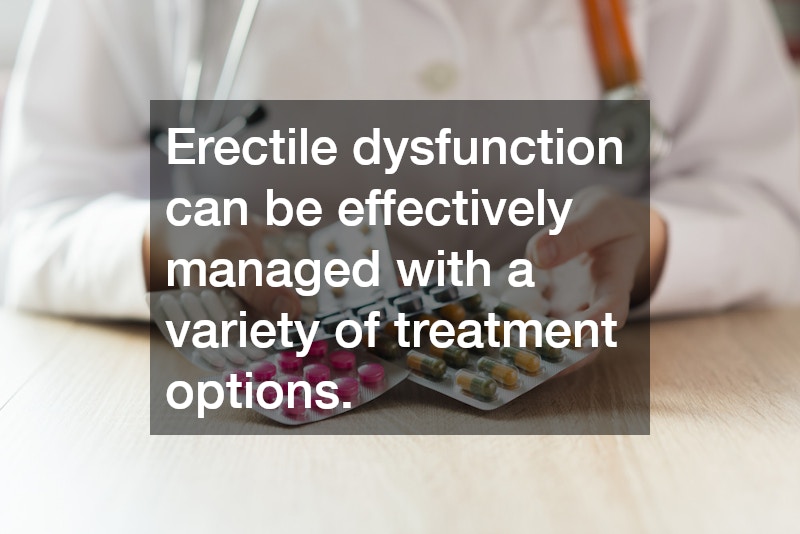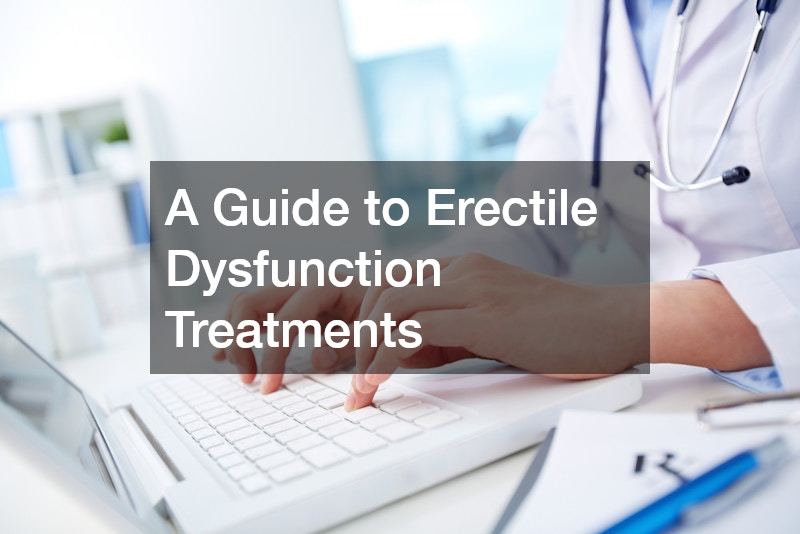
Erectile dysfunction (ED) is a common condition affecting many men worldwide. Understanding the available treatment options is crucial for effective management and improved quality of life.
What are the Causes of Erectile Dysfunction?
Physical Causes
ED can result from various physical causes, including heart disease, diabetes, and obesity. Smoking and excessive alcohol consumption are lifestyle factors that also increase the risk of developing ED.
Hypertension and high cholesterol are known to damage blood vessels, which can impact erectile function. Certain medications, especially those for managing blood pressure and mood disorders, may also contribute to ED.
Furthermore, age-related decline in testosterone levels can play a significant role in the condition. A sedentary lifestyle can exacerbate these physical causes, making regular exercise imperative for men at risk.
Psychological Causes
In addition to physical causes, psychological issues like stress, anxiety, and depression can severely impact erectile function. The presence of mental health problems can create a cycle of anxiety and reduced sexual performance, exacerbating the condition.
Relationship issues and poor communication with a partner can lead to emotional disconnection, further affecting sexual intimacy. Mental health therapy and counseling might be beneficial in these scenarios.
How Do Oral Medications Work for ED?
PDE5 Inhibitors
PDE5 inhibitors like Viagra and Cialis are among the most common oral medications for ED. These drugs work by relaxing the blood vessels in the penis, allowing increased blood flow to help achieve and maintain an erection.
They are typically taken before sexual activity and can be effective for several hours. It’s important to note that sexual arousal is still necessary for these medications to work effectively.
Effectiveness and Side Effects
The effectiveness of oral medications like PDE5 inhibitors can vary among individuals. Factors such as overall health, age, and the severity of ED can influence outcomes.
Common side effects of these medications include headaches, flushing, and digestive issues. More serious side effects, although rare, may involve changes in vision or hearing and prolonged erections, known as priapism.
Are There Non-Drug Treatments for ED?
Therapy and Counseling
Therapy and counseling can be essential components of erectile dysfunction treatment, especially when psychological factors are at play. Cognitive-behavioral therapy (CBT) can help in identifying and altering negative thought patterns contributing to ED.
Couples therapy can also enhance intimacy and communication between partners, addressing any relational issues affecting sexual health. Mental health professionals skilled in sexual health can provide valuable insights and strategies.
Lifestyle Changes
Lifestyle modifications can be a highly effective form of erectile dysfunction treatment, notably through diet and exercise. Regular physical activity improves cardiovascular health and boosts circulation, directly impacting erectile function.
A balanced diet with plenty of fruits, vegetables, and whole grains helps in maintaining a healthy weight and reducing ED risk factors like diabetes and vascular issues. Limiting alcohol consumption and quitting smoking are also vital steps.
What Are the Advanced Treatment Options?
Injection Therapy
For severe cases of ED, injection therapy can be an effective treatment option. Medications are injected directly into the penis, inducing an erection within minutes by dilating the blood vessels.
This option is often recommended when oral medications are ineffective or contraindicated due to other health conditions. Patients are typically trained by medical professionals to self-administer the injections safely.
Surgical Options
Penile implants and vascular surgery are advanced treatment options for ED, typically considered when other treatments have failed. Penile implants involve surgically placing devices into the penis, offering the ability to control erections manually.
Vascular surgery is less common but may be appropriate for cases involving artery blockages or injuries impeding blood flow to the penis. This option tends to be more invasive and is reserved for younger men with specific vascular issues.
How Do I Know Which ED Treatment is Right for Me?
Consulting a Healthcare Professional
Consulting with a healthcare provider is essential in choosing the right ED treatment. They can assess the root causes of ED and recommend an appropriate treatment plan based on recent medical history and current health status.
Healthcare professionals can guide patients through the complexity of available options, ensuring informed decisions align with personal health needs and lifestyle. It is not uncommon for several treatments to be trialed before finding an effective solution.
Personal Factors
Personal factors such as age, health conditions, and personal preferences play a critical role in determining the most suitable ED treatment. Patients with specific health conditions might need to avoid certain medications or options altogether.
Personal comfort with procedures, whether they be oral medications, injections, or surgeries, can influence treatment choice. Financial considerations and insurance coverage may also impact the feasibility of certain treatments.
Erectile dysfunction can be effectively managed with a variety of treatment options. Consulting with healthcare providers and considering personal choices are crucial steps in finding the best solution for each individual.
.
Erectile dysfunction (ED) is a common condition affecting many men worldwide. Understanding the available treatment options is crucial for effective management and improved quality of life.
What are the Causes of Erectile Dysfunction?
Physical Causes
ED can result from various physical causes, including heart disease, diabetes, and obesity. Smoking and excessive alcohol consumption are lifestyle factors that also increase the risk of developing ED.
Hypertension and high cholesterol are known to damage blood vessels, which can impact erectile function. Certain medications, especially those for managing blood pressure and mood disorders, may also contribute to ED.
Furthermore, age-related decline in testosterone levels can play a significant role in the condition. A sedentary lifestyle can exacerbate these physical causes, making regular exercise imperative for men at risk.
Psychological Causes
In addition to physical causes, psychological issues like stress, anxiety, and depression can severely impact erectile function. The presence of mental health problems can create a cycle of anxiety and reduced sexual performance, exacerbating the condition.
Relationship issues and poor communication with a partner can lead to emotional disconnection, further affecting sexual intimacy. Mental health therapy and counseling might be beneficial in these scenarios.
How Do Oral Medications Work for ED?
PDE5 Inhibitors
PDE5 inhibitors like Viagra and Cialis are among the most common oral medications for ED. These drugs work by relaxing the blood vessels in the penis, allowing increased blood flow to help achieve and maintain an erection.
They are typically taken before sexual activity and can be effective for several hours. It’s important to note that sexual arousal is still necessary for these medications to work effectively.
Effectiveness and Side Effects
The effectiveness of oral medications like PDE5 inhibitors can vary among individuals. Factors such as overall health, age, and the severity of ED can influence outcomes.
Common side effects of these medications include headaches, flushing, and digestive issues. More serious side effects, although rare, may involve changes in vision or hearing and prolonged erections, known as priapism.
Are There Non-Drug Treatments for ED?
Therapy and Counseling
Therapy and counseling can be essential components of erectile dysfunction treatment, especially when psychological factors are at play. Cognitive-behavioral therapy (CBT) can help in identifying and altering negative thought patterns contributing to ED.
Couples therapy can also enhance intimacy and communication between partners, addressing any relational issues affecting sexual health. Mental health professionals skilled in sexual health can provide valuable insights and strategies.
Lifestyle Changes
Lifestyle modifications can be a highly effective form of erectile dysfunction treatment, notably through diet and exercise. Regular physical activity improves cardiovascular health and boosts circulation, directly impacting erectile function.
A balanced diet with plenty of fruits, vegetables, and whole grains helps in maintaining a healthy weight and reducing ED risk factors like diabetes and vascular issues. Limiting alcohol consumption and quitting smoking are also vital steps.
What Are the Advanced Treatment Options?
Injection Therapy
For severe cases of ED, injection therapy can be an effective treatment option. Medications are injected directly into the penis, inducing an erection within minutes by dilating the blood vessels.
This option is often recommended when oral medications are ineffective or contraindicated due to other health conditions. Patients are typically trained by medical professionals to self-administer the injections safely.
Surgical Options
Penile implants and vascular surgery are advanced treatment options for ED, typically considered when other treatments have failed. Penile implants involve surgically placing devices into the penis, offering the ability to control erections manually.
Vascular surgery is less common but may be appropriate for cases involving artery blockages or injuries impeding blood flow to the penis. This option tends to be more invasive and is reserved for younger men with specific vascular issues.
How Do I Know Which ED Treatment is Right for Me?
Consulting a Healthcare Professional
Consulting with a healthcare provider is essential in choosing the right ED treatment. They can assess the root causes of ED and recommend an appropriate treatment plan based on recent medical history and current health status.
Healthcare professionals can guide patients through the complexity of available options, ensuring informed decisions align with personal health needs and lifestyle. It is not uncommon for several treatments to be trialed before finding an effective solution.
Personal Factors
Personal factors such as age, health conditions, and personal preferences play a critical role in determining the most suitable ED treatment. Patients with specific health conditions might need to avoid certain medications or options altogether.
Personal comfort with procedures, whether they be oral medications, injections, or surgeries, can influence treatment choice. Financial considerations and insurance coverage may also impact the feasibility of certain treatments.
Erectile dysfunction can be effectively managed with a variety of treatment options. Consulting with healthcare providers and considering personal choices are crucial steps in finding the best solution for each individual.
.





